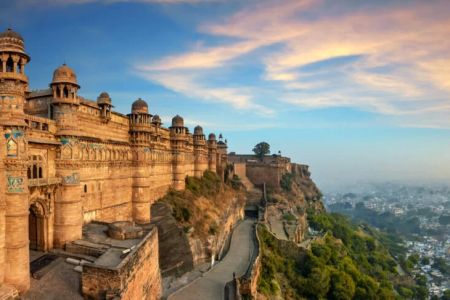Where to Visit in India for Eco-Tourism Experiences
Introduction to Eco-Tourism in India
India, with its diverse landscapes, rich wildlife, and indigenous cultures, offers a vast array of eco-tourism experiences for travelers seeking sustainable travel. Eco-tourism in India emphasizes the preservation of natural habitats, conservation of wildlife, and support for local communities through responsible tourism. Whether you're an adventure seeker, a nature lover, or someone looking to explore off-the-beaten-path destinations, India’s eco-tourism spots provide opportunities for an unforgettable and meaningful journey.
Top Eco-Tourism Destinations in India
1. Kerala: God's Own Country
Kerala, renowned for its backwaters and verdant landscapes, offers some of the best eco-tourism experiences in India. The state’s well-preserved natural reserves and wildlife sanctuaries, like Periyar Tiger Reserve and Silent Valley National Park, allow visitors to immerse themselves in pristine nature. Kerala’s eco-friendly houseboats, located on the tranquil backwaters, are a unique way to experience this beautiful landscape while minimizing your environmental footprint.
2. Sikkim: A Himalayan Gem
Sikkim, nestled in the northeastern Himalayas, is a model for sustainable tourism. The state has taken significant steps toward eco-tourism by promoting organic farming, wildlife conservation, and eco-friendly travel initiatives. The Khangchendzonga National Park, a UNESCO World Heritage Site, is an ideal spot for eco-conscious travelers seeking adventure and tranquility in one of India’s most biodiverse regions.
3. Rajasthan: Desert Eco-Tourism
Rajasthan’s Thar Desert might not seem like a typical eco-tourism destination, but the region is home to several unique initiatives that emphasize sustainable travel. Desert camps and eco-friendly accommodations, like those near Jaisalmer, allow travelers to experience the desert ecosystem without harming the environment. Additionally, Rajasthan’s conservation programs, such as the Desert National Park, focus on preserving desert wildlife, including the endangered Great Indian Bustard.
4. Uttarakhand: The Land of Spirituality and Nature
Uttarakhand, with its lofty Himalayan peaks and sacred forests, offers exceptional eco-tourism experiences. The Jim Corbett National Park, India’s oldest national park, is not only famous for its tiger population but also for its eco-friendly initiatives. Other eco-friendly sites include the Nanda Devi Biosphere Reserve, where you can enjoy nature trails and learn about sustainable practices in the region.
Sustainable Travel Experiences in India
Eco-tourism in India is not only about exploring natural beauty, but it also emphasizes low-impact travel and responsible behavior. Many of India’s eco-tourism destinations promote sustainable travel practices, such as eco-lodges, solar-powered resorts, and zero-waste activities. In addition to conserving nature, these initiatives support local communities by providing them with income opportunities through eco-friendly jobs.
1. Wildlife Safaris
Indian wildlife safaris, such as those in the Bandhavgarh National Park or Kaziranga National Park, offer travelers the chance to experience wildlife in its natural habitat. These parks are deeply committed to conservation and work towards protecting endangered species like tigers, rhinoceroses, and elephants. A safari through these parks not only provides an unforgettable adventure but also helps fund important conservation projects.
2. Village Tourism
Village tourism is a growing trend in India, where visitors can stay in rural communities and experience the local way of life. This form of travel helps sustain local cultures and provides direct benefits to rural communities by promoting traditional handicrafts, organic farming, and eco-friendly practices. In places like Rajasthan and Kerala, visitors can enjoy authentic experiences while supporting sustainable development.
Real Traveler Stories and Insights
To truly understand the impact of eco-tourism in India, it’s essential to hear from those who have experienced it firsthand. For example, Anna, a traveler from the UK, recalls her visit to Sikkim’s Khangchendzonga National Park. "The trek through the mountains was breathtaking," she says. "What stood out was the amount of effort that went into preserving the environment, from maintaining eco-lodges to educating visitors about minimizing their ecological footprint."
Similarly, John from the US had a memorable experience in Rajasthan's Desert National Park. "Staying in the eco-camps was such a unique experience. We were surrounded by nothing but sand dunes, and the best part was learning about the conservation efforts for desert species. It’s amazing how much thought is given to sustainability in such a harsh environment," he shares.
How to Plan Your Eco-Tourism Trip in India
Planning your eco-tourism trip in India requires a bit of preparation, but the rewards are worth it. When selecting your destinations, focus on areas known for their conservation efforts, such as national parks and protected biosphere reserves. Opt for eco-friendly accommodations and travel options, such as staying in solar-powered hotels or using public transportation. Additionally, be sure to respect local wildlife, follow Leave No Trace principles, and support local businesses that prioritize sustainability.
If you're interested in booking your eco-tourism trip, visit Travel India One for expert recommendations and to plan your next adventure. From Kerala’s backwaters to Sikkim’s mountain trails, the options are endless for those seeking to experience India’s beauty while preserving its natural treasures.











